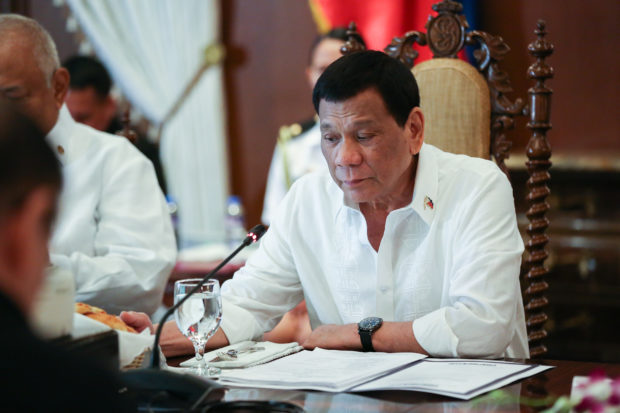CA: No proof of Duterte’s hand in harassment, ‘red tagging’ of rights lawyers
MANILA, Philippines –There is no evidence that President Rodrigo Duterte has a hand in the harassment and red-tagging of human rights lawyers, the Court of Appeals ruled as it dismissed the amparo and habeas data petition filed by the National Union of Peoples’ Lawyers (NUPL).
“We arduously examined the records and the evidence presented but found nothing that would point to a specific act committed by President Duterte which violates or tends to violate petitioners’ right to life, liberty or security,” the Court of Appeals’ former special 15th division said in a ruling dated July 26.
“There is also no showing of President Duterte’s actual involvement or knowledge of the complained acts such as the circulation of posters containing petitioners’ pictures. Verily, petitioners failed to establish the accountability of the President, thus he must be dropped as [a] respondent in this case,” the appeals court added.
Duterte has been included as one of the respondents in the amparo and habeas data petition filed by NUPL, citing command responsibility as commander-in-chief for the acts committed by the military.
The appeals court said that in amparo proceedings, while a President enjoys immunity from suit, he cannot be automatically dropped as respondent. He may be included as a respondent if the acts complained of were committed with his direct or indirect agreement.
Article continues after this advertisementWrit of Amparo is a remedy available to any person whose right to life, liberty and security has been violated or under threat while the writ of habeas data is a remedy available to any person whose right to privacy in life, liberty or security has been violated or under threat by the unlawful gathering of information about the person, his or her family and home.
Article continues after this advertisementBoth writs serve as preventive and curative roles to curb extrajudicial killings and enforced disappearances.
The appeals court also pointed out that “the individual petitioners failed to substantially prove that their life, liberty, and security are threatened with violation.”
The appellate court further said that “while mere threats fall within the mantle of protection of the writs of amparo and habeas data, the alleged threats imputed against the respondents herein are not supported by substantial evidence, thus stand on nebulous grounds.”
Aside from Duterte, also named as respondents in the petition are Defense Secretary Delfin Lorenzana, AFP Chief of Staff Gen. Benjamin Madrigal Jr., National Security Adviser Hermogenes Esperon Jr., AFP Deputy Commander for Intelligence Brig. Gen. Fernando Trinidad, AFP Chief of the Intelligence Service Maj. Gen. Erwin Bernard Neri, Philippine Army chief Lt. Gen. Macairog Alberto and AFP Deputy Chief of Staff for Civil Military Operations Maj. Gen. Antonio Parlade, Jr.
In filing its petition, the NUPL cited specific incidents where their officers and members experienced the alleged harassment by military officers and “tagged, threatened, vilified or subjected to surveillance.”
The group said the pattern is clear, and that their members are being threatened not for their individual actions as lawyers per se, but for being members of the NUPL and the cases, clients and issues they take on.
They added that while the killings, harassments and surveillance of its members have been happening since 2001, these attacks significantly increased under Duterte administration.
NUPL President Edre Olalia said they are not surprised anymore by the decision, adding that the amparo remedy has time and time again failed expectations for immediate judicial protection.
“How many more lawyers and human rights defenders need to be killed, vilified, harassed, threatened and labeled before the dots are connected?” he said.
Olalia added the decision only reinforces their view that domestic remedies for redress of human rights violations are by and large ineffective and unavailing, especially under the present situation.
But he added they will elevate the case to the Supreme Court./ac
RELATED STORY
